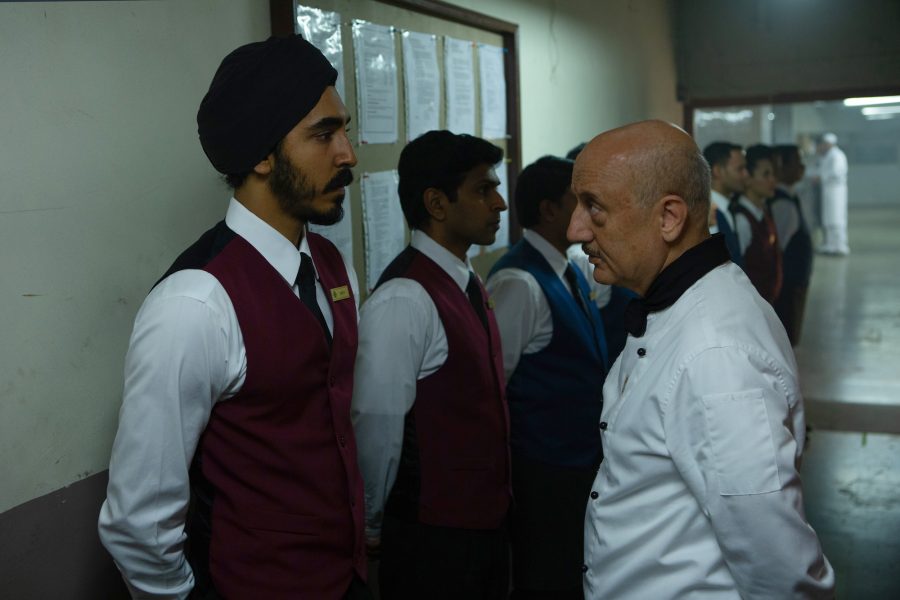Thrusting ordinary people into extraodinary situations is a recipe followed by many gripping films, and it is certainly the backbone of Director Anthony Muras’ “Hotel Mumbai.” The twist, however, is that this thriller is based on true events, depicting real heroic acts from unlikely heroes. The film centers on an attack on the Taj Mahal Palace Hotel in 2008, during which armed terrorists assaulted several locations in Mumbai, a cosmopolitan city on India’s west coast, killing 164. The necessary security forces were hours away in the nation’s capital, New Delhi, and as a result, over 500 guests and staff were trapped inside for several days.
The film itself follows a few storylines. Arjun (Dev Patel) is a poor waiter in the hotel restaurant who struggles to do right by his pregnant wife and infant daughter. Though his boss, Chef Hemant Oberoi (Anupam Kher), thinks he’s careless, the two end up working together to keep the guests safe, acting as the film’s emotional core. While Kher plays a real person, Patel’s Arjun is actually a composite character representing different staff that worked at the hotel, and both do justice to the people they portray.
Among the guests are newlyweds Zahra (Nazanin Boniadi) and David (Armie Hammer) who want only to escape with their baby, looked after by its nanny Sally (Tilda Cobham-Hervey). At one point, David makes the heartbreaking decision to separate from his wife in the hotel so that he can attempt to save their newborn despite knowing there is a low chance of them both surviving. The couple’s chemistry is not that well-established before this split happens, but luckily Boniadi and Hammer are sufficiently strong performers that they can make the audience care about them once they are separate.
The film features the young band of terrorists quite heavily. Chief among them is Imran (Amandeep Singh), whose guilt tears away at him once he starts to realize that he may have been played for a fool by the man who hired him. Other characters include the gruff Russian Vasili (Jason Isaacs), a couple of Australian backpackers and the Mumbai police chief and his partner.
Religion is presented very candidly in “Hotel Mumbai.” In one scene, after the attacks have begun, a British guest sees Arjun, a Sikh man, wearing his turban, and she grows increasingly uncomfortable. Recognizing this concern, Arjun directly approaches the woman, calmly refusing to take off his turban and instead explaining the significance behind the turban and how it is a symbol of honor for him. The woman silently understands and they move on. The film juxtaposes the terrorists’ violence and their adherence to Islamic norms, such as avoiding pork and inappropriate contact with women. It’s not all that groundbreaking.
“Hotel Mumbai” is unafraid to present uncomfortable conversations, but its ultimate intent is not to be a think piece. It is a thriller through and through, and it excels in this regard. Nick Remy Matthew’s cinematography spans cramped utility closets and breathtaking skylines, a visual treat from beginning to end. The action is relentless and the tension palpable, every gunshot crackling through the theater and keeping the audience on the edge of their seat. Chef Oberoi and Arjun’s master-student relationship is wonderful — Kher and Patel have exceptional chemistry — and one of the film’s best moments comes at the end when the two share a tearful moment together outside the Taj, as if father and son.
Maras has made many films about tragic world events, such as his 2011 short “The Palace,” an award-winning film about a family struggling to survive the 1974 invasion of Cyprus. The cast of his latest project features Indian, American and British actors, and much of the film features English-language dialogue alongside a few other languages — Hindi and Marathi — native to the Indian subcontinent. From David to Vasili to the nameless Australian backpacker, there are also a number of characters that Western audiences can relate to. Fair enough, a fancy hotel in India’s largest city will house many international guests, but it feels odd to give them so much focus if not to attract a non-Indian audience.
It begs the question — who is the intended audience for “Hotel Mumbai?”
By the time the credits roll, it’s clear that the film aims to resonate universally with audiences, regardless of their ethnic or religious background. The guests and staff band together to survive, but “Hotel Mumbai” does not rely on gunshots and explosions to execute its themes, even though they are present in its climax. The film does, however, fall short of its goal to spread a message of how compassion and love prevail in times of tragedy and chaos. While the heroism of the staff and guests is certainly inspiring in an otherwise good action film, don’t expect profound social commentary.
A version of this article appears in the Monday, March 25, 2019, print edition. Email Fareid El Gafy at [email protected].






















































































































































